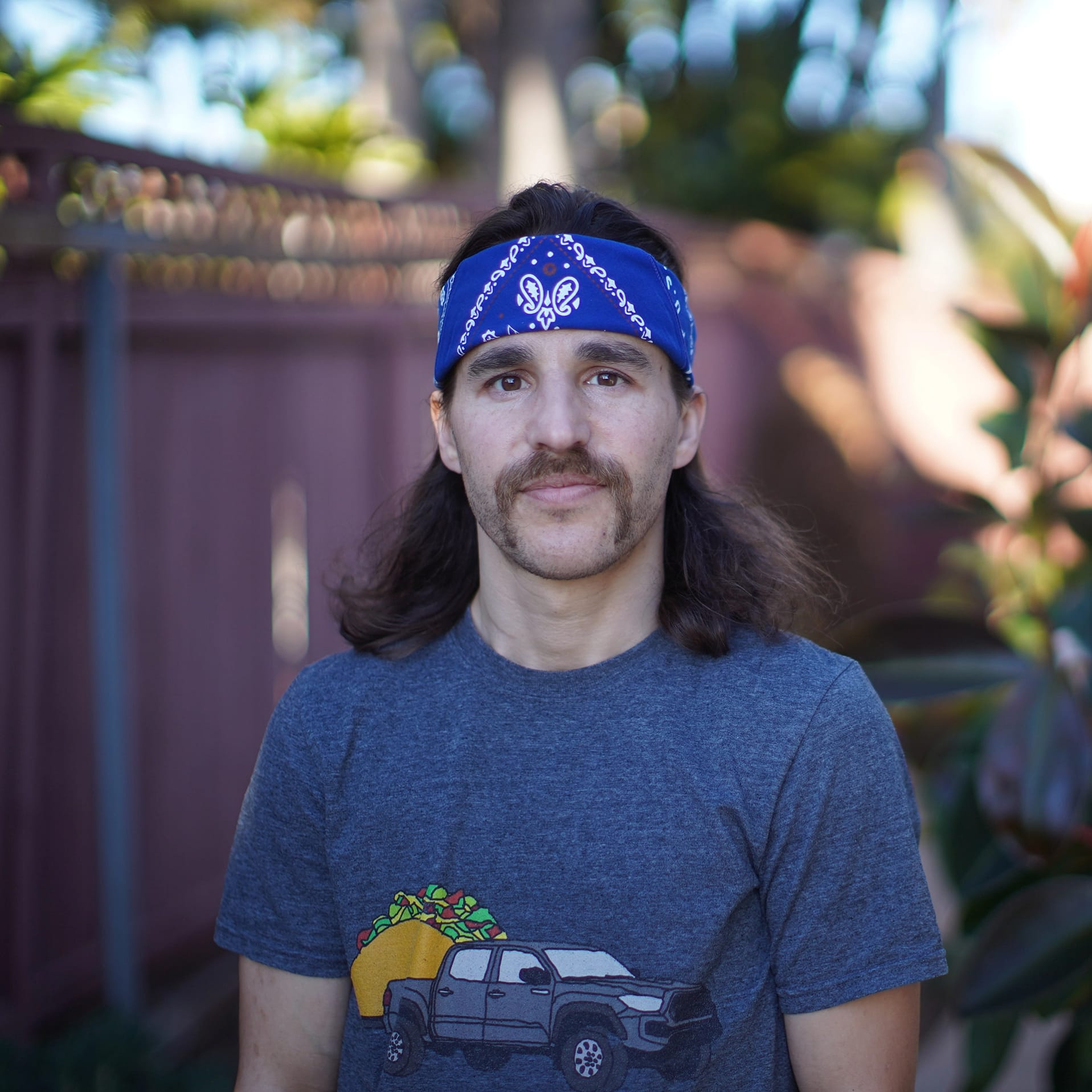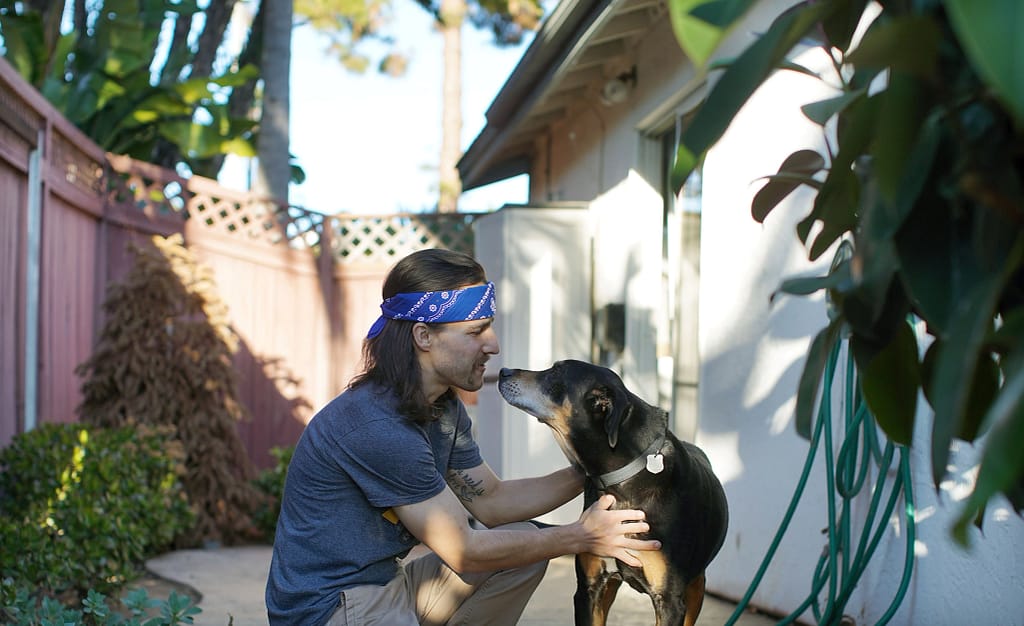
Andrew (1988-2022) shared his story with Compassion & Choices in December 2021. He spent his last year advocating for medical aid in dying in Illinois and building awareness about this compassionate option as a storyteller, through his blog and podcast, and as a proposed intervenor in CMDA v. Bonta.
I want to be alive. I want to continue teaching my special ed students, I want to continue watching hockey, I want to keep rollerblading around Oceanside in the beautiful California weather. I love spending time at the beach, playing video games and spending time with my roommate’s dog, Jaxson. I don’t want to have cancer, and I don’t want to be in this position. But there’s not much I can do about that. What I can control is how I go out from this disease. Cancer will eventually take my life, but I’d rather not suffer when I could go out peacefully and on my own terms.

Andrew Flack with his roommate’s dog Jaxson
In early 2017, I finished my master’s degree at San Diego State University while working full-time as a special ed teacher at a public high school in San Marcos. I had been feeling fatigued but chalked it up to my long days burning the candle at both ends. Surely my energy levels would increase when I graduated from my master’s program and finished out the school year.
They didn’t. Over the summer following the end of the school year, I could hardly get through half a set of simple exercises, and I was losing weight. By August, I found that I couldn’t eat without nausea or vomiting. I had had kidney cancer as a child, and after 25 years of being cancer-free, something in me suspected that I had cancer again. In October, a colonoscopy revealed my hunch was correct: I had stage III adenocarcinoma of the colon/rectum. I was 29 years old.
I embarked on an intensive treatment regimen that included radiation, chemotherapy, surgery, and finally, eight cycles of intravenous chemo — the “gold standard” of treatments for colorectal cancer. “I want to be glowing green as I walk out of here,” I told my doctor. I completed treatments in July 2018. My doctors were fairly confident I was out of the woods.
Three months later, I went in for a minor cancer-related surgery. When I woke up from the anesthesia, the nurses seemed to be avoiding my gaze.
The cancer had returned.
A molecular profile of the tumor revealed three very rare, distinctive mutations that explained why the standard treatments weren’t more effective; with these mutations, an effective treatment plan does not currently exist.
I had to do it all over again: radiation, chemo, surgery. Still, my family and I continued to believe this was something I would overcome. It wasn’t until I underwent another major surgery in February 2019 that the reality sunk in. My parents were there when we learned the cancer had spread significantly throughout the pelvic region, including the prostate, bladder, and tailbone. “We won’t be able to cure this cancer,” the doctor said.
Throughout that year and the next, I resumed various treatments and tried to enjoy every day. In the summer of 2019 alone, I traveled by train from Seattle to LA with my mom, Suzy; I spent entire days fishing with family on Lake Geneva in Wisconsin; I caught a ballgame at Wrigley Field; I got ready to return to the classroom to teach; and I crushed many pizzas with family and old friends.
In a bizarre way, my prognosis was liberating: I finally knew where I stood with this disease, and although it wasn’t even close to the outcome I wanted, it forced me to reevaluate my life. My prognosis is a constant reminder that every day is a gift. Even with this type of diagnosis, there’s a tremendous amount of good that can come out of it, from all the people I meet because of it to the time with family and friends that I treasure to the ability to revel in the little things.
In December 2020, I ended up in the hospital with a severe kidney infection. My oncologist explained that these types of hospital stints would likely continue as the disease progressed. He sat with me for a long time discussing the risks and complications that lay ahead, and made it clear that we were fighting a war that we simply couldn’t win. He and another physician agreed that I likely had six months or less left to live.
I shared with him that one of my fears was that even if I reached the point at which I was ready to die, my body would just keep holding out, stubbornly, and I would experience a lot of suffering and discomfort as a result. That was when he told me about another option I have as a patient with a terminal disease. He said California’s End of Life Option Act authorizes terminally ill adults with a prognosis like mine to request a prescription for a peaceful death.
I had never heard of medical aid in dying. I felt scared, because learning about it meant I was having to face the reality of my terminal illness. But I also felt a sense of relief. It sounds odd, but I had a great sense of relief knowing that this was an option for me. If I ever reached a point where I was doing nothing but suffering, I would have some power over this cancer. I didn’t have to have a difficult and trying end.
The doctor and I agreed that this conversation would qualify as our first verbal discussion for an aid-in-dying prescription and that we would revisit the topic 15 days later, per California state law. Two weeks later, I decided to fill out the paperwork.
After I made the decision to request the medication, I pulled my three sisters and my mom and dad aside one-on-one to tell them about what I was feeling and why this was an important option for me. I also made sure to ask how they were feeling. Having that discussion is really important, and it’s not something you talk about just once; as we move forward and this disease progresses, we continue to have conversations about it. It’s tremendous for me to have their support. When many people pass, it’s a tragic, sudden thing. But for me, having this option, I have the ability to transition from this life surrounded by the people I love the most. That’s something I think about: I’ll be able to be with these people and feel comfortable and secure and loved.
I also decided to start a podcast about medical aid in dying and California’s End of Life Option Act with my friend and roommate, Hasban. We discovered that there’s not a lot out there on this topic, so I saw the podcast as one of the opportunities that has come with this disease. The goal was to shed light on a tough subject, to hopefully be a positive influence on someone like me with a terminal illness or a family member.
As for me, there are certain points at which I will know it’s time to consider the option. I don’t want to be lying in bed, hooked up to a lot of tubes. I’ve been dealing with a lot of chronic pain for quite a few years. I’m working with the palliative care team now at UC San Diego Medical Center and they do an amazing job helping me manage that pain, but of course there are tougher days. On those harder days, the pain can be pretty intense, and it will likely get worse. I also want to maintain a level of independence, the ability to walk to the beach or walk the dog around the block. And I don’t want to deteriorate so badly that my family’s lasting memories of me are those of me in agony.
I like the idea of spending my final moments under the stars. Luckily, from where I live now I’ve got a great view of the stars, and I can hear the ocean. I also figure I have to have a dog with me, so Jaxson, my roommate’s dog, has agreed to support me at that time. So I’d like to have him at my side and be surrounded by loved ones. That sounds fine to me.
When I started this journey with cancer, I decided I will not view myself as a victim of this disease. I choose to see it as cancer providing me with opportunities — opportunities to become closer to family and reconnect with old friends, opportunities to be involved with modern medicine, opportunities to meet amazing new people, opportunities to reach my physical and mental limits and push beyond those limits, opportunities to reflect on my own beliefs, and, finally, the opportunity to educate and advocate about end-of-life options. Cancer isn’t something anybody chooses, but I can choose how I move forward.
Mail contributions directly to:
Compassion & Choices Gift Processing Center
PO Box 485
Etna, NH 03750
Compassion & Choices is a 501 C3 organization. Federal tax number: 84-1328829